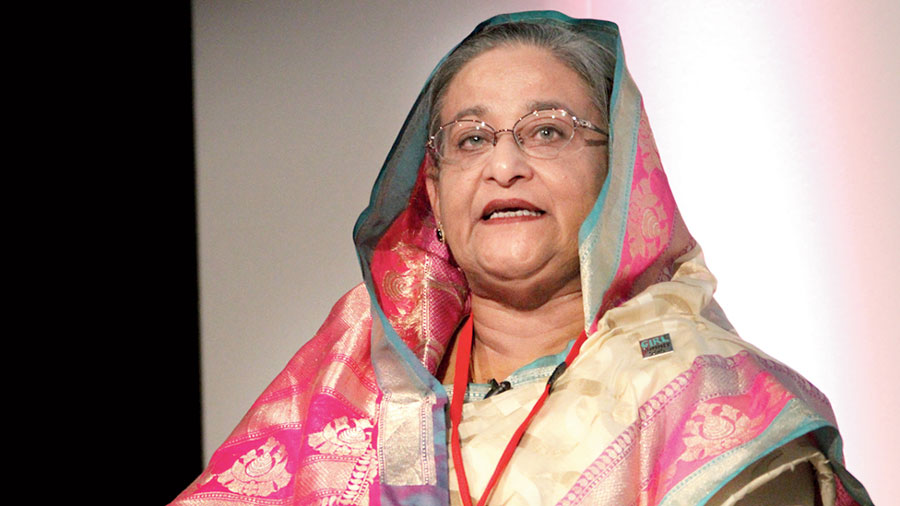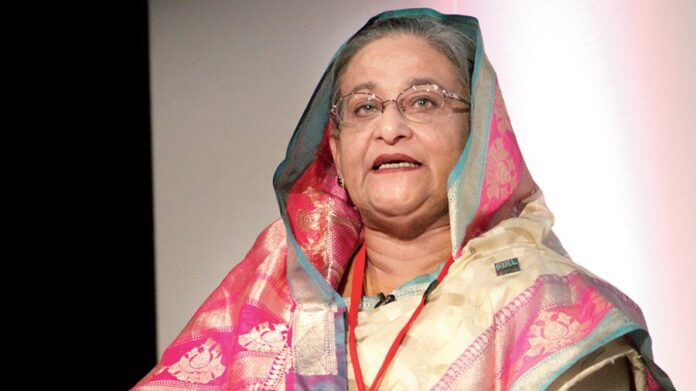
by Taj Hashmi 22 August 2022
Would India salvage the Hasina regime? A resounding, positive no is the answer. Contextualization of the hypothetical question is necessary before any further elaboration. A recent statement by Bangladesh Foreign Minister Abdul Momin prompted this absurd question. By the way, the minister frequently makes absurd and embarrassing comments about himself, the government he represents, and the nation as a whole. Often, his comments are absurd, indecent, and mendacious. On the occasion of the Janmashtami festival in Chattogram last Thursday (17th August), he told his Hindu Bangladeshi audience that he had asked the Indian Government to do “whatever is necessary” to maintain the Hasina government in power, during his recent official visit to India. Moreover, he said that both countries needed political stability, and this could be achieved if India supported Sheikh Hasina.
Although Sheikh Hasina hasn’t yet expressed her opinion on the minister’s grossly objectionable statement, Rana Dasgupta, a prominent Hindu leader in Bangladesh, has condemned the statement as offensive to Bangladeshi Hindus, implying the Hindu community in Bangladesh requires Indian protection due to its extraterritorial loyalty.
In light of the seditious implications of the statement, some prominent Awami League (ruling party) leaders have argued that the Hasina Administration didn’t authorize the minister to make such unwarranted statements. Some of them claimed that Abdul Momin wasn’t even a member of the ruling party (a blatant lie).
It’s controversial that the Foreign Minister made these remarks as the chief guest of Janmashtami festival since he also argued Hasina’s departure would be dangerous for Bangladesh, India, and Bangladeshi Hindus. He added that if Hasina stays in power, India would have to spend less on border security with Bangladesh. Despite his efforts, it appears that he was unable to whitewash his statement. There has been no response from India so far. The possibility of India intervening to save the Hasina Regime, as Momin implied not-so-subtly, is extremely embarrassing for India as that would make India a hegemonic state. Momin fails to recognize the changing dynamics of global politics and thus doesn’t think India is both unwilling and unable to doctor elections in Hasina’s favour, as it did thrice between 2008 and 2018. India might not be so willing to put all its eggs in the Awami basket given Hasina’s flirtations with China, which are akin to an extramarital affair by an estranged wife right in front of her husband.
The 2008 elections were jointly rigged by the military regime of General Moin U. Ahmed and the Manmohan Singh government in India. In 2014, India’s Secretary for External Affairs, Sujatha Singh, intervened directly in the Bangladesh elections to facilitate an Awami League victory; and in 2018, the most grossly rigged elections in the history of the country installed Hasina for another five-year term with Indian and Chinese support. Of late, however, the Hasina Regime has irritated India a great deal, something laymen and some analysts fail to notice. Thus, the old equation about bonhomie between them no longer exists. There’s hardly any reciprocity between them, and Bangladesh serves only Indian interests by providing the latter with transit facilities and uninterrupted use of Bangladeshi ports. The list of India’s arbitrary and intrusive behaviour against Bangladesh since its emergence in 1971 is too long to display here. The irony of this situation is that Abdul Momin recently described this uneven relationship as one between a husband and wife. Also worth mentioning is Hasina’s public acknowledgment of this uneven friendship in 2018: “Whatever we’ve given to India so far, they will remember it forever”.
Taking this awkward relationship between Bangladesh and India further, one might wonder why the former on the one hand makes overtures to China for the sake of infrastructure development with loans (on less-than-generous terms); it continues to bend over backward to maintain good relations with India. While Bangladesh needs Chinese money, it can’t live without appeasing India’s strategic and economic interests even at the cost of Bangladesh’s sovereignty and economic interests. Until very recently, Hasina relied exclusively on Indian commandos for her personal security. She knows the biggest nemesis she faces would be a hostile India. Her job involves a lot of tight rope walking to keep both China and India happy. How long? That’s the question!
In the same way that Bangladesh needs a friendly India for security reasons, India needs a friendly Bangladesh that won’t harbour any separatist or terrorist groups from India. Yet, Hasina’s commitment to mega infrastructure development in Bangladesh, including two deep sea ports (Sonadia and Payra), the Teesta Barrage Project, and the second terminal at Sylhet Airport. President Xi Jinping signed an MOU (memorandum of understanding) with Dhaka in 2016 for over $25 billion in projects. Indian foreign secretary Harsh Vardhan Shringla visited Dhaka, following media reports that China had invested in the Teesta Management Project. China promised a US$983 million loan to Bangladesh to implement the “Teesta River Comprehensive Management and Restoration Project”. In an irritated mood, India started exerting heavy pressure on Bangladesh to halt the project on the ground that it threatens their north-eastern region’s security, especially the “Chicken’s Neck” (the 22-kilometer-wide Siliguri Corridor that connects India’s Northeast to the mainland).
Dillydallying over giving Bangladesh its due share of the Teesta waters for several decades (which is at least 4,500 cusecs, not 300 cusecs as it receives from India during the lean period) doesn’t increase the CBM between the two neighbours. While the Manmohan Singh Government reneged from releasing Bangladesh’s due share in the Teesta waters in 2011 (on the flimsy ground that West Bengal Chief Minister Mamata Banerjee was dead against giving Bangladesh more water), the Modi Administration assured Bangladesh that after the “BJP victory” in West Bengal elections, his government would sign the Teesta Water Sharing Pact with Bangladesh. As a side note, the Trinamul Congress Party won again in West Bengal.
Therefore, it is clear that India’s promise to mend its relationship with Bangladesh is hollow. According to some experts, when Hasina visited India in April 2017, India tried to sign a long-term defence pact with Bangladesh. Others believe the pact has already been signed, and Bangladesh has already provided India with certain extraordinary privileges or capitulations, including the moving of its troops inside Bangladesh. Furthermore, 31 hydropower projects or barrages that India has built across the Teesta in Sikkim pose a threat to Bangladesh by denying millions of hectares of land in greater Rangpur, Dinajpur, and Bogura districts their due share of water. It’s reported that Hasina will sign a free-trade agreement with India during her September visit, which already has a massive trade surplus with Bangladesh.
In other words, on the one hand, India is apprehensive about Chinese investments in Bangladeshi infrastructure; on the other, it has followed a hegemonic and intrusive policy toward its smaller neighbour. In addition, India has blatantly interfered in the national elections of Bangladesh in order to elect the pro-Indian Awami League to power. In sum, most Bangladeshis have no love lost for India or the ruling Awami League party which has turned their country into a vassal state, if not an Indian colony. So, Abdul Momin’s candid (and stupid) assertion that Bangladesh will seek Indian support (actually, intervention) to perpetuate Awami League rule in the country wasn’t a slip of the tongue, and Hasina’s total silence on it simply smacks of her total approval to what the Foreign Minister has said with no ambiguity. In light of this, Abdul Momin can’t be given any benefit of the doubt for what appears to be an irresponsible comment or another gaffe on his part, which he has been displaying since becoming Foreign Minister. He meant what he said. What he said reflected the desire of Sheikh Hasina.
The apparent inadvertence or insensitivity of Momin’s statement – which even diehard Awami League leaders and supporters have disowned, and the disorganized opposition is feebly mocking it as seditious – seems to be a piece of strategic communication (in terms of security studies) intended to convey to the majority of Bangladeshis, who want the Awami-led, pro-Indian regime removed. This is a stern warning to them that the Hasina Regime isn’t alone. Momin’s message is clear. According to the text, the Awami League will seek India’s direct intervention if necessary to remain in power for many decades to come. In contrast, Hasina deliberately distances herself from Momin’s strategic communication due to pragmatism or strategic considerations. Momin and the government he represents recognize, however, that things have turned very bad for the country economically, politically, and internationally of late. There’s no wonder why the US, multiple Western human rights organizations, and the UN have set out to punish the Hasina Regime in the name of restoring democracy and human rights. There’s no way to predict Hasina’s course of action in the coming months to assuage Western critics. Momin’s flirtatious overtures to India could be an ineffective message to the West that Bangladesh under Hasina won’t mind going against China by inviting India to intervene in the internal affairs of Bangladesh, “by any means”, as he affirmed in his statement. However, the question remains: Can Bangladesh appease India, China, and the West simultaneously? Indefinitely, too?
The author is a historian-cum-cultural anthropologist, Taj Hashmi, Ph.D., FRAS, is a retired professor of Security Studies at the APCSS, US. He has written several books and hundreds of journal articles, and newspaper op-eds. As an analyst of current affairs, he regularly appears on talk shows about Bangladesh, South Asia, and World affairs. His latest book, Fifty Years of Bangladesh, 1971-2021: Crises of Culture, Development, Governance, and Identity, was published by Palgrave-Macmillan in May 2022.

